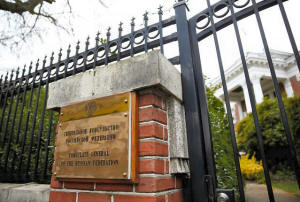|
Fewer Russian spies in U.S. but getting
harder to track
 Send a link to a friend
Send a link to a friend
 [March 28, 2018]
By Warren Strobel and John Walcott [March 28, 2018]
By Warren Strobel and John Walcott
WASHINGTON (Reuters) - The U.S. decision to
expel 60 alleged spies is unlikely to cripple Russian spying in the
United States because others have wormed and hacked their way into
American companies, schools, and even the government, current and former
U.S. officials said.
Moscow's spy services still use the cover of embassies and consulates,
as Washington does. But they also recruit Russian emigres, establish
front companies, dispatch short-term travelers to the United States,
recruit Americans, and penetrate computer networks, the officials said.
"Russia used to have one way of doing things. Now, Putin is - let a
thousand flowers bloom," a former senior U.S. official said in a recent
interview, describing Moscow's move to a more multifaceted approach
under President Vladimir Putin, a former Soviet spy himself.

The FBI follows the movements and monitors the communications of
suspected foreign spies, but the increased Russian presence and the
advent of commercially available encrypted communications are an added
challenge to the FBI's counter-espionage force, said the officials, some
of whom spoke on condition of anonymity to discuss the sensitive topic.
As one U.S. official put it when asked if Russian spying is a harder
target: "Itís more complex now. The complexity comes in the techniques
that can be used."
While the CIA tracks foreign spies overseas and the National Security
Agency monitors international communications, the FBI is responsible for
spy-catching inside the United States.
The White House on Monday said it would expel 60 Russian diplomats, 12
of them at the U.N. mission, and close the Russian consulate in Seattle
as part of a multi-nation response to the Kremlin's alleged nerve agent
attack on a former Russian spy in Britain.
Briefing reporters, a senior U.S. official said there were "well over"
100 Russian spies posing as diplomats in the United States before the
expulsion order.
A veteran U.S. official charged with keeping tabs on Russian espionage
said the administration downplayed the number of suspected Russian spies
working under diplomatic cover to avoid giving the Russians a clearer
picture of how many people are under surveillance.
The actual number varies over time, but "it averages more like 150 or
so," the official said.
"We've got a very, very, very good counter-intelligence apparatus," said
Robert Litt, a former general counsel for the U.S. Director of National
Intelligence. "There are a lot of people in the FBI whose job it is to
track these people - and they're very good at it."
TAKES TEN TO TANGO
Still, it can take 10 or more U.S. trained FBI and local law enforcement
officers to keep tabs on one trained spy for a 24-hour period - covering
back entrances to buildings and multiple elevators, and being alert for
changes in clothes, cars and even hairpieces, the same official said.
[to top of second column]
|

A sign at the gated entrance of the Consulate General of the Russian
Federation in Seattle, Washington, U.S., March 26, 2018.
REUTERS/Lindsey Wasson/File Photo

One Russian tactic is sending a large number of people, including
just one or two intelligence officers, streaming out of a diplomatic
mission at once, making it harder for the FBI to decide whom to
follow, said a former U.S. intelligence officer, also speaking on
the condition of anonymity.
Microsoft Corp. was one target of the Russian espionage operation in
Seattle, U.S. officials familiar with the expulsions said. One goal
was identifying targets for recruitment in the company's coding
operations because the company's products are used in so many
applications, they said.
Microsoft declined comment.
In 2010, Alexey Karetnikov, a 23-year-old Russian spy who had worked
at testing computer code in Microsoft's Richmond, Wash.,
headquarters, was deported by an immigration judge.
Several of the officials traced the Kremlin's more aggressive spying
approach to Putin's 2012 return to the presidency, and Moscow's 2014
seizure of Crimea and intervention in eastern Ukraine.
"We observed a commensurate uptick in Russian intelligence and
espionage activity in the U.S. and across Europe, although few
analysts connected the dots," said Heather Conley, a former State
Department official now at the Center for Strategic and
International Studies think tank.
Michael Rochford, a former FBI chief for espionage, said the mass
expulsion of suspected spies posing as diplomats will affect
Russia's security services and dent morale at their Moscow
headquarters.

After past expulsions, he said, Russian spies have handed their
operations over to officers who remain behind, or to "illegals" -
long-term agents with no demonstrable connections to the Russian
government.
The risk, he said, is that when Moscow replaces the expelled
personnel, it will not be clear who the new spies are.
"Sometimes it's better to know who they are and follow them," he
said.
(Additional reporting by Jonathan Landay; Editing by Mary Milliken
and James Dalgleish)
[© 2018 Thomson Reuters. All rights
reserved.]
Copyright 2018 Reuters. All rights reserved. This material may not be published,
broadcast, rewritten or redistributed.
Thompson Reuters is solely responsible for this content. |